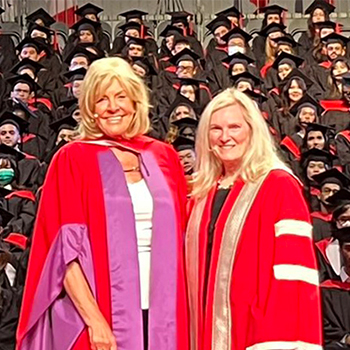Author, journalist and human rights advocate Sally Armstrong received an honorary doctor of laws degree during York University’s convocation ceremony for graduands from the Faculty of Liberal Arts & Professional Studies. Armstrong visited York University on Oct. 13 to accept an honorary doctor of laws degree during Fall Convocation.
Known for her pursuit of stories that expose the abuse of women, Armstrong has reported from war zones in Afghanistan, Iraq, Somalia and more. She’s written numerous articles, books and documentaries about women, who otherwise would have been the ignored casualties of conflict or the overlooked heroes of making peace. Armstrong was promoted to Officer of the Order of Canada in 2017. She is a former member of the International Women’s Commission at the United Nations.
After congratulating graduands, Armstrong delivered a memorable and inspiring convocation address using the lens of a storyteller to frame her remarks.
“Today is your day – all you dreamers and schemers and change agents and inventors and poets,” she said. “I’m so envious of you. There has never been a better time to take your newly minted skills out into the world and start the story of your life. You’ve already written the prologue. But what will you put in the chapters to come?”
She spoke to grads about the theory known as the Butterfly Effect. “It’s based on the notion that everything in life is connected. Everything no matter how small. So, if a butterfly flaps its wings on one side of the world, eventually the influence will be felt on the other side of the world,” said Armstrong, who told graduands that they are the “new couriers of the Butterfly Effect.”
The Butterfly Effect is present in the war zones that Armstrong documents in her work. “The world I work in as a journalist takes me to places that are shuddering from the effects of yesterday’s Butterfly Effect. When I cover stories in zones of conflict, I don’t see a complicated abyss. Mostly I see a huge need for new ideas, an altered vision, a better way,” she said. “This is the Global Village that you are inheriting. It’s waiting for you with pleading, open arms. It needs your scholarship, your fresh new take on the world. The skills and talents you bring to this battered planet are the good news.

“Violence, our bullied environment, poverty, injustice and war need the powerful flapping of your butterfly wings. You are the people struck with the repair of the planet. You are the citizens with the knowledge to make a difference,” she told grads. “It was people like you who began to change the world as we know it during the last 100 years.”
That change, she noted, included momentous accomplishments – abolishing slavery, securing the right to vote for women, campaigning to stop land mines and the movement to protect our climate. International change led to the formation of the United Nations, but the world is still at risk due to authoritarianism, racism and the denial of truth and in the face of surging intolerance, climate bullying and conflict, Armstrong urged grads not to be complacent.
“Everything we care about depends on what action you will take starting tomorrow. The success of your future will depend very much on the size of your vision. Pay attention to it. A vision can take you to places you have never been before, or it can lock you in small, confined spaces that will make you yearn for the past rather than reach for the future.
“Demand leadership that has vision. Demand a job that values you more than the gross national product. Demand work that engages the heart as well as the mind and body. Demand things you can believe in as well as invest in. And remember, ‘You are what you condone,’” she said. “It’s been said that moral courage is a rarer commodity than bravery in battle or even great intelligence. Yet it is the one essential vital quality for those who seek to change a world that yields most painfully to change.”
Referring to the philosopher and writer Hannah Arendt, Armstrong told grads that apathy, inertia and passivity is the fuel for injustice and evil, which in turn enables the bully, the cheat and the fanatic. “The nature of goodness therefore bears a very keen resemblance to intervention,” said Armstrong. “People who seek to serve their conscience or find meaning in their lives or who simply seek the quiet splendour of moral growth are obliged to get involved when something is wrong – in the community, in the country, indeed in the world.”
She urged grads not to be passive and to intervene when they see injustice. “People who do not intervene when something is amiss, give tacit permission for injustice to continue,” said Armstrong.
“Start creating the book that is the story of your life right now. You are the art of the possible,” she said. “What glorious contributions you are going to make to this weary old world.”
In closing, she asked grads to move boldly forward with their stories. “You have the knowledge, talent and moxie to challenge the status quo and put a human face on the Global Village.”
Originally published in YFile.
